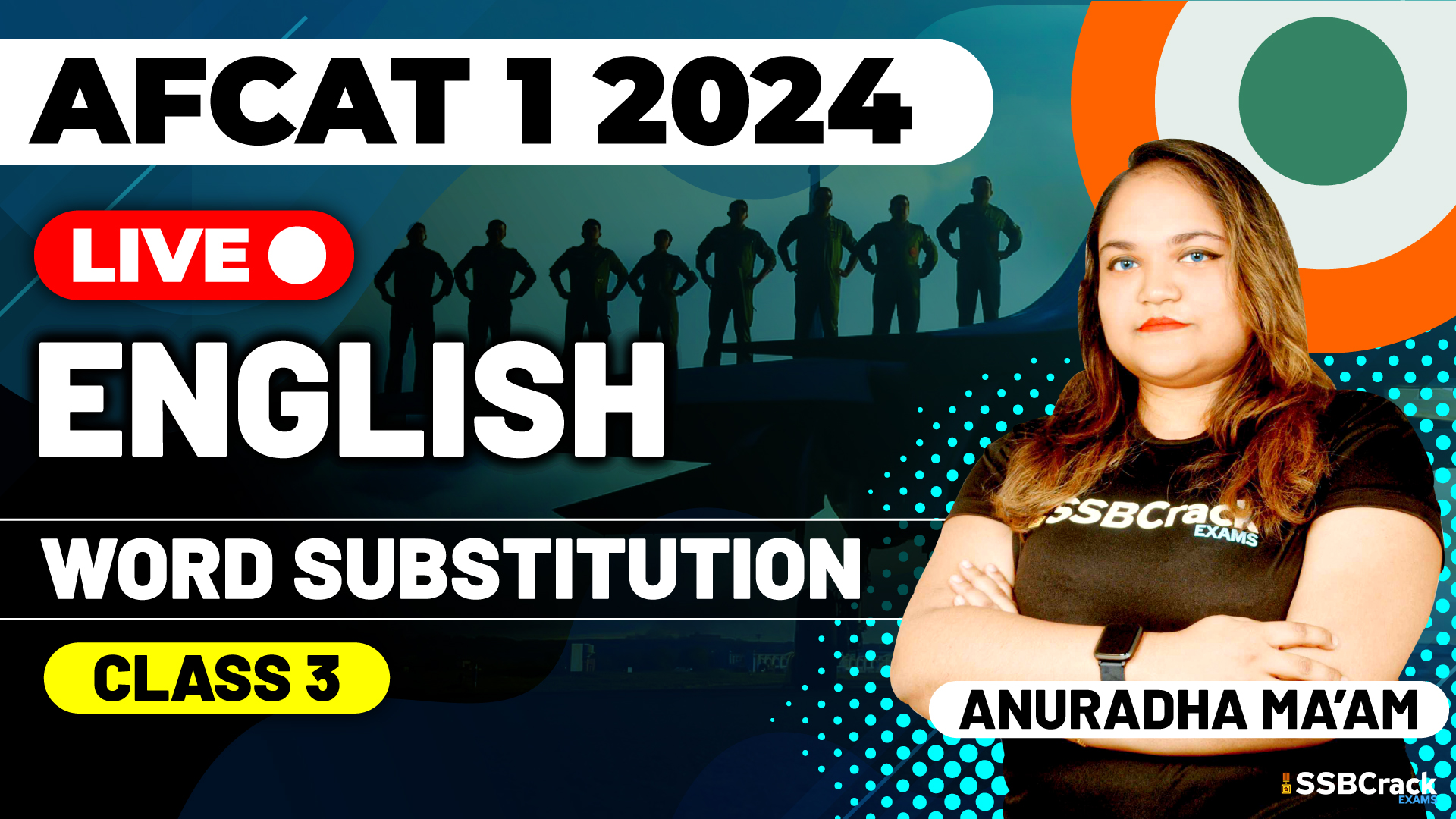In the labyrinth of the English section of the Air Force Common Admission Test (AFCAT), the topic of One Word Substitution emerges as a beacon of importance. Success in AFCAT demands a profound grasp of English vocabulary, and One Word Substitution plays a pivotal role in assessing an aspirant’s language proficiency. This article unravels the significance of One Word Substitution in AFCAT, providing insights from the One Word Substitution Live Class 3. Let’s explore why this topic is crucial, effective preparation strategies, and the art of tackling One Word Substitution questions with precision.
Directions: In the following question, out of the four alternatives, select the alternative which is the best substitute of the given phrase.
Q) Severely abusive writing in journals
(a) imaginary
(b) speculative
(c) sarcastic
(d) scurrilous
Ans. (d)
Q) A group of three powerful people.
(a) trio
(b) tritium
(c) trivet
(d) triumvirate
Ans. (d)
Q) The study of worms and insects
(a) taxidermy
(b) entomology
(c) ornithology
(d) paleontology
Ans. (b)
Q) A person who attends to the diseases of the eye is an
(a) oculist
(b) optimist
(c) obstetrician
(d) optical
Ans. (a)
Q) A professional soldier hired to serve in a foreign army
(a) Mercenary
(b) Liquidator
(c) Venal
(d) Hireling
Ans. (a)
Q) A collection of slaves
(a) Coffle
(b) Crew
(c) Company
(d) Cortege
Ans. (a)
Q) One who is always doubting
(a) Sceptic
(b) Deist
(c) Rationalist
(d) Positivist
Ans. (a)
Q) Artistic, musical or dramatic interpretation
(a) reparation
(b) report
(c) imitation
(d) rendition
Ans. (d)
Q) A person who leaves his own country in order to go and live in another
(a) emigrant
(b) refugee
(c) immigrant
(d) expect
Ans. (a)
Q) Walking in sleep
(a) Sleepy-head
(b) Somnolence
(c) Somnambulism
(d) Insomnia
Ans. (c)
Q) Murder of a king
(a) homicide
(b) fratricide
(c) regicide
(d) parricide
Ans. (c)
Q) That which is no longer fashionable or in use
(a) unused
(b) ancient
(c) obsolete
(d) old
Ans. (c)
Q) The depository where state records and documents are preserved
(a) museum
(b) library
(c) emporium
(d) archive
Ans. (d)
Q) Governed by a sense of duty
(a) conscious
(b) sensible
(c) intelligent
(d) conscientious
Ans. (d)
Q) Incapable of making errors
(a) infallible
(b) incorrigible
(c) persistent
(d) inexplicable
Ans. (a)
For more questions, check out AFCAT 1 2024 Exam English Live – Word Substitution – Class 3
The Significance of One Word Substitution in AFCAT
One Word Substitution is more than a lexical exercise; it is a window into an aspirant’s command over the English language. Here’s why excelling in this area is indispensable for AFCAT aspirants:
1. Precision in Communication:
- Why it Matters: In the defense sector, precision in communication is paramount. One Word Substitution assesses an aspirant’s ability to express complex ideas concisely—a skill vital for effective communication in the Air Force.
- How to Excel: Cultivate a habit of expanding your vocabulary. Regularly engage with a variety of reading materials to encounter and internalize new words.
2. Efficient Expression of Ideas:
- Why it Matters: Air Force officers must articulate ideas efficiently. One Word Substitution challenges candidates to find succinct expressions for multifaceted concepts, mirroring the demand for clarity in military communication.
- How to Excel: Practice creating one-word substitutes for complex ideas. Develop a bank of such substitutions through consistent vocabulary enhancement.
3. Cognitive Flexibility:
- Why it Matters: Military personnel encounter diverse situations that demand cognitive flexibility. One Word Substitution evaluates an aspirant’s mental agility in finding apt substitutes for varied concepts.
- How to Excel: Delve into the nuances of words and their meanings. Understand the contextual usage of words, enabling you to identify suitable substitutes effortlessly.
Strategies for Effective Preparation
- Build a Robust Vocabulary:
- The cornerstone of success in One Word Substitution is a formidable vocabulary. Regularly read diverse materials, including newspapers, literature, and articles, to encounter a spectrum of words.
- Word Association Techniques:
- Foster associations between words and their meanings. Mnemonic devices, word roots, and contextual associations can aid in remembering and recalling words during the exam.
- Thematic Categorization:
- Group words thematically. Create categories based on shared meanings or contexts, helping you organize your vocabulary for efficient recall during the examination.
- Regular Practice:
- Engage in consistent practice with One Word Substitution questions. Familiarize yourself with the diverse contexts in which one-word substitutes are used, enhancing your ability to choose the right word in various scenarios.
Tackling One Word Substitution Questions with Precision
- Context is Key:
- Pay attention to the context provided in the question. Understanding the intended context aids in selecting the most appropriate one-word substitute.
- Elimination Strategy:
- If uncertain, employ an elimination strategy. Rule out options that do not fit the context, increasing the probability of selecting the correct answer.
- Diverse Exposure:
- Expose yourself to a variety of literature, including technical, scientific, and literary works. This broad exposure enriches your vocabulary, allowing you to navigate the diverse terrain of One Word Substitution questions.
Conclusion: Conquering the Linguistic Landscape of AFCAT
In conclusion, the journey to success in AFCAT necessitates conquering the linguistic landscape, and One Word Substitution stands as a formidable terrain to be mastered. By diligently building and expanding your vocabulary, practicing consistently, and refining your ability to choose precise substitutes, you can navigate the intricacies of One Word Substitution with confidence. This proficiency not only ensures success in AFCAT but also cultivates essential language skills crucial for effective communication—a cornerstone of leadership roles in the Air Force.







